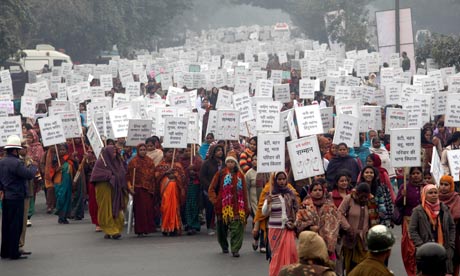One in four men in Asia 'admit to committing rape'? It doesn't add up
No one's denying the problem of sexual violence in Asia, but this is a deeply misleading statistic based on flawed research

The rape and murder of a young woman in Delhi last year, and thesubsequent death sentence handed out to the four perpetrators, has prompted all manner of soul-searching in India. Women's rights have – finally – come to the forefront in a country where the concept remains curiously alien to many of its inhabitants.
Last week's verdict in India also coincided with the release of a UN-led study on sexual violence in Asia and the Pacific. The fact that the survey does not include India in its sample has nevertheless failed to dissuade commentators from drawing a parallel between its findings and the Delhi case. The shocking headline figure that 25% of the men surveyed admit to raping a partner or a stranger appears to offer unequivocal confirmation that Asian women are the victims of a deep-rooted, cultural problem.
As with many studies of this type, however, what we're witnessing is the wide dissemination of one hopelessly misleading statistic, while the rest of the research in the report – the stuff that actually matters – is ignored.
The study covered a small, but diverse number of Asian countries: Bangladesh, Cambodia, China, Indonesia, Sri Lanka, and Papua New Guinea. In each country, men were asked about their experiences both within and outside of relationships. In most cases, the samples were not nationally representative. In the case of Papua New Guinea, for instance, all of the respondents were based on the island of Bougainville.
As the samples were not nationally representative, it's impossible to use the figures to make any generalisations about the populations in these countries (far less the continent of Asia). More importantly, out of all of the locations surveyed, the only territories in which positive responses to the questions on rape were 25% or higher were Bougainville and the Indonesian province of Papua. In both instances the number of "yes" responses from men were staggering: 43.8% for Papua, and 59.1% in Bougainville.
Both areas have a recent history of conflict, which might explain the appalling prevalence of sexual violence indicated by the study. Indeed if the two samples had not been included, the overall figure of men admitting to rape would have dropped to 18%. In itself that's still a deeply worrying statistic, but the extent to which two isolated cases can swing our perception of an entire continent should be enough to prompt a little caution.
Perhaps most troubling of all, though, is the nature of the questions used, which varied across different countries. In Bangladesh, the first country included in the study, the questions related strictly to "forced sex". In all of the other countries, an additional question was asked which attempted to measure the prevalence of "coerced sex". The wording of this question made no explicit mention of coercion, however, and simply asked: "Have you had sexual intercourse with your partner when you knew she didn't want to, but believed she should agree because she was your wife/partner?"
Speaking on Radio 4's More or Less programme on Sunday, Rachel Jewkes, the study's lead technical adviser, argued that the use of coercion was implied by the way the question had been framed. That may well be the case, but it does seem to have had a tangible impact on the results, given that the one sample group which was asked explicitly about "forced sex" (Bangladesh) also had the lowest number of positive responses.
Even if we accept this defence, the basic principle of pushing together independent samples, without any population weighting, is a recipe for producing statistical gibberish. China has a population of around 1.35 billion, while Bougainville sits at less than 200,000. It may well be the case that a quarter of the survey's respondents indicated they had raped someone during the course of their lives, but that's an entirely different thing from saying a quarter of the people in the surveyed countries have committed rape.
There is undoubtedly a cultural dimension to violence against women, and at the very least the UN study demonstrates that the legal framework for dealing with sexual violence in many Asian states is barely fit for purpose. But we don't solve that problem by exaggerating it to the point of absurdity, or pretending that we can treat diverse populations, with essentially nothing in common, as upholding some kind of ubiquitous misogyny.
No comments:
Post a Comment